






























ANOTHER YEAR OF VIRTUAL GRADUATE RECRUITMENT is nearly behind us. Hybrid is now the name of the game as we return to campus and assist you in person.
We look to the future through a different lens, and we plan for this future with greater insight to our capabilities. The challenges of the last few years have not deterred us, rather, it has empowered us to offer a service unlike before.
This Career Update edition is special, we have a larger and young editorial team. Our new Careers Service Coordinator, Ms Bridgetti Mashabane and our five interns have dedicated tremendous effort to bring this edition to you. Our articles come with fresh voices and perspectives of graduates who, like our readers, have been navigating their job search journey in this new world of work. Our feature articles include a special write-up




on the UWC Graduate Competency Development Programme and UWC’s efforts to enhance workplace readiness. We also share with you the latest updates to the UWC Career Xplora portal and bring to you, insights on how to manage stress while job hunting; highlight important post-pandemic work related skills; share how to transition from a virtual world of work to hybrid and how to manage the first hundred days in a job as well as managing that first payslip and black tax.

While the national unemployment rate is slowly decreasing and more opportunities continue to become available, we urge you to not lose momentum and remain consistent in your career development, a great opportunity might surprise you. Be open to the new and innovative career paths that this new world of work has to offer.


 From the Ed Team
Left to right, from top to bottom: Nazrana Parker, Natalie Thomas, Bridgetti Mashabane, Mbalenhle Malamlela, Mahir Samodien, Imrah Dramat, Simamkele Dyasophi and Ivanka Katts.
From the Ed Team
Left to right, from top to bottom: Nazrana Parker, Natalie Thomas, Bridgetti Mashabane, Mbalenhle Malamlela, Mahir Samodien, Imrah Dramat, Simamkele Dyasophi and Ivanka Katts.
Career Update is produced by the Office for Student Development, University of the Western Cape.

Editors: Editors: Nazrana Parker, Natalie Thomas, Bridgetti Mashabane, Simamkele Dyasophi, Ivanka Katts, Imrah Dramat, Mbalenhle Malamlela and Mahir Samodien.
Subbing, design & layout: Kult Creative.
Printing: Fingerprint Workers Co-operative.
Thank you to all the writers and participants.
Career Update, Sep 2022.
Telephone: 021 959 2436. Email: cdp@uwc.ac.za.
Disclaimer:
The opinions expressed in this magazine are those of the authors and writers and do not necessarily represent nor reflect the views of the University of the Western Cape. All rights reserved. Articles may only be reproduced, stored or transmitted with written permission of the copyright holder.
What’s new to Career Xplora
Graduate employability is serious business Skills to navigate the post-pandemic world of work
From virtual to hybrid: A new transition in the world of work

Strategising your career path
Managing job search stress and anxieties
Your first payslip and managing ‘Black Tax’
Legal career guide: Lighthouse Law Careers in Industrial Psychology
Breaking misconceptions: Recognising the importance of Arts and Humanities

THE ADAGE ‘DYNAMITE COMES IN SMALL PACKAGES’ comes to mind when we look at our activities for 2021 and 2022.
Career Xplora, the UWC online careers services portal achieved another milestone during the lockdown. In 2021 – it had more than 50 000 logins by students and alumni and we aim to surpass this milestone in 2022. Despite being a small team, UWC Careers Service has certainly been accessible to our student community. Let’s see who has been using their online Careers Service:
by Natalie Thomas and Nazrana ParkerCareers by Symplicity
Employer Directory (4%)
Mock Interview (5%)
Resume Builder (9%)

(4%)
Service Events
CV Review and Feedback
Job Board
Without a doubt, our students seem to take advantage of accessing their campus careers service in the virtual space. Online career service provision has resulted in an increased attendance and participation in our monthly online job search skills workshops, CV and Letter of Motivation reviews, quarterly virtual career xpo’s and graduate recruitment events which run throughout the year. Hear what your peers say about their experiences in using the portal.
It broadened my knowledge of recruitment opportunities and companies I could apply at.
This taught me how to approach recruiters and what to expect in an interview.
The Xpo opened my mind to more career possibilities, I appreciated the much-needed reminder to set up my CV and Letter of Motivation prior to my engagements with recruiters.
The Virtual Xpo was so easy to navigate and find exactly what I was looking for.





I can filter search for job opportunities and get updates on new workshops right on the App.
There is no need to open my laptop when I want to check whether my favourite company has any new job opportunities listed. Did you know that in 2021, Career Xplora had more than 50 000 logins by students and alumni and we aim to surpass this milestone in 2022.
While on the 24hr bus trip back to KZN, I explored the Career Xplora Resource Library and used the resources to learn how to develop my CV and motivational letter. By the time I arrived at my front door, I had completed my CV on my laptop, incredible! I always thought CVs were hard to draft and unnecessary for a first-year student but the resources on Career Xplora changed everything. Within the first month of sending out that CV, I was contacted for two interviews, unbelievable! To get CV feedback is a huge bonus because it prepares us for very tough and stiff competition in the job market, where I am now working at an Environmental Consulting Firm while studying. That is why I chose ‘CV review & received feedback’ as the most valuable component of Career Xplora. A Big Thank You to the team at Careers Service. Please continue!! It helps.
This allows for a third opinion after I ‘double-checked’ my CV.
I received much needed constructive feedback on how to improve my CV and Letter of Motivation.
Which component of UWC Career Xplora do you value the most?
CAREER XPLORA has greatly enhanced efficiency and quality of services to recruiters and students.

I value weekly job blasts, I like to be updated on all the opportunities available to me. This helped with my job search and will help many other students who are not sure where to look.
It shows me relevant job opportunities which is helpful and I am able to see job postings that I do not find elsewhere.
Because there are few jobs in my field, I value having a platform where I can find opportunities and companies for future reference.
Interviews make me very anxious. I used the Mock Interview tool to help me prepare for my engagement with recruiters during the Career Xpo.
This assisted me to better formulate answers, it made me feel more comfortable and at ease to practice using the mock interview tool.
How has Career Xplora enhanced your Job Search experience?
I have access to so many different jobs on one platform. I am able to find contacts and how to apply. I can easily check the platform to remind myself of closing dates and requirements.
I am able to enhance my CV writing and interview skills. Career Xplora gave me all the necessary equipment to be competitive in the job market. They also give feedback on your CV, which is a gift from heaven!
This is the only tool I use for my job search and it is very mobile friendly.
It has made my job searching experience much easier. I have no trouble finding opportunities in my field of study because Career Xplora sends me updates every week.
I found workshops to attend which helped me know where to start in the job search process and what resources are available to me to make the process easier.
So readers, there you have it! We hope that you will get those fingers moving, and log onto UWC Career Xplora at https://uwc-csm.symplicity.com/ students, use your iKamva details to log in and make use of the amazing and helpful job search resources available to you 24/7/365.
Remember UWC Career Xplora is available to you via the UWC VPN. Also, as an alumnus you can access the portal for an additional three years post your completion of studies. If you have queries about UWC Career Xplora email us at careerxplora@uwc.ac.za

underwent its much-anticipated facelift during the week of 27 June 2022. Students now have a fresh and simple navigation experience. The interface is modernised and replaces the left navigation with an intuitive top navigation and improved avatar menu.
We have customised and localised the tabs:
Opportunities
Workshops and Events
Employer Directory
Job Search Resources Book a Consultation* new functionality
These most popular navigation elements are at the forefront of the student experience.
By clicking on the Avatar menu, students will see the other options with UWC Career Xplora and can access their:
Profile
My Documents (this is where you store and submit your CV and Letter of Motivation for review)
Surveys
My Career Xplora Account
Students must visit the ‘My Career Xplora Account’ section to set their majors to make
the system work for them! The system will send Weekly Job Blast emailers and Bi-Weekly Events Newsletters based on the selected majors and areas of interest. If changes are made to the academic programme, especially the majors, students will need to update their majors on the system in order to continue receiving relevant information.
Shows Career Fairs, Recruitment Events and Job Search Skills Workshops.
Shows all internships, trainee programmes, part-time work, competitions, and other opportunities.
Allows you to explore industries and potential employers. If you click on the company name you can access the company profile and the persons responsible for graduate recruitment.

Gives you access to the Multi-Media Library to access a variety of electronic campus career service resources to help you with your job search preparation and a Mock Interview tab to practise for your interview.
Allows you to request a consultation with one of our Careers Service staff either virtually or in-person.
You can now make use of the “UWC Careers Service Live Chat Support” function and email us from the ‘Help and Feedback’ function accessible in your Avatar drop down menu.
We trust that you will enjoy this new look to your Career Xplora portal and look forward to introducing additional tools in the near future. http://uwc-csm.symplicity.com/students







THE NEW ACRONYM IN THE UWC HOOD IS ‘GCDP’. In 2021 the DVC: Student Development and Support, Prof Pamela Dube launched the Graduate Competency Development Programme (GCDP).
GCDP is a special pilot project that aims to enhance workplace readiness for UWC students through an 18-month internship programme housed across Student Development and Support (SDS) departments.
This pilot initiative echoes the first and fourth SDS key strategies of holistic student experience and co-curricular opportunities, and the promotion of professional excellence and transformation- imperatives for both students and staff, respectively. The programme further resonates with the 1st, 2nd and 8th Goal Areas of the UWC Institutional Operating Plans (IOP) of 2016-2020 and 2021-2025.

GCDP provides a structured platform for UWC graduates to:
• Attain work experience and foster their employability skills;
• Provide graduates with opportunities to apply knowledge and skills learned in the classroom in a real workplace context thereby placing them at a competitive advantage;
• Expose graduates to learning about organisational culture, workplace fit and provide opportunities for networking in their field, and
• Create a recruitment pool of potential employees within student development and support.
The first cohort of eight GCDP interns were welcomed to UWC SDS in July 2021 after competing with over 250 other applicants.
The cohort participated in a robust virtual orientation programme facilitated by a GCDP Core Team made up of senior SDS staff and relevant HR staff. The interns underwent a
theoretical immersion of the SDS environment during the first 6 weeks of their placement and rediscovered the world of SDS at UWC.
They also attended a number of UWC’s Centre for Innovative Education and Communication Technologies (CIECT) training workshops included among other:
• Basic Video Editing
• Mobile Video Editing
• Image Editing
• Digital Storytelling
• Screen recording, compression and conversion
As a final task for their induction each intern was responsible for developing a 10-minute presentation showcasing SDS. Their presentations included their understanding of the departments and offerings within SDS; a demonstration of the value that SDS adds to the holistic development of students and their understanding of the UWC IOP and SDS strategic priorities.
Commenced their placement within a relevant SDS department in August 2021.
Intern
Ms Leanne Christians
Ms Ivanka Katts
Ms Nozipho Mchunu
Mr Khanya Deliwe
Ms Taran Beukes
Ms Zenande Mzantsi
Ms Kay Rudolph
Ms Simamkele Dyasophi
BSc: Environmental & Water Science
B Com Honours: Industrial Psychology
B Com: Information Systems
B Com: General Information Systems and Management
BA Honours: Industrial Psychology
BSc Honours: Environmental & Water Science
Bachelors of Social Work
B Admin Honours: Industrial Psychology
SDS Allocation
Centre for Student Support Services
Office for Student Development
DVC SDS
Residential Services
Financial Aid
Residential Services
Centre for Student Support Services
Office for Student Development
The criteria for placement of GCDP interns within the SDS units included:
• Academic background and interview performance of the intern; vs
• The feedback received from Units in the GCDP State of Readiness Survey; vs
• The GCDP activities arranged per unit; vs
• The current skill set of the intern and the competency development opportunities on offer in the relevant units; vs
• Staff available to supervise the interns; and projects available for the intern to partake.

Interns’ feedback
I was a nervous wreck, but HR was so understanding and patient, it really made the experience easier. I was excited, relieved, scared, hopeful and grateful all at once. The most exciting was the opportunity to be employed at my alma mater. The interview went well, the interviewers were very warm and welcoming which eased my nervousness and I pulled through. Look at where I am now!
The interview went well, the interviewers were very warm and welcoming which eased my nervousness and I pulled through.
Simamkele and Ivanka about induction:
The orientation allowed me enough time to get to know the various departments within SDS and the university as a whole. During the induction I realised there was quite a lot I did not know about SDS as a student and that there are programmes I would’ve participated in. The GCDP Core Team supported us during this period. We met regularly to get to know each other and we formed a WhatsApp group as interns. It was a bit scary starting a new position while I was busy writing my final exams. Everything was done online –via Google Meet. Regular meetings were held with all 8 interns and their prospective managers, nothing was done in isolation.
I quite enjoyed the virtual setting as it allowed me to familiarise myself with work and the content at my own pace. UWC provided the necessary tools to make working from home possible. Having regular meetings with the GCDP Core Team was really helpful as they assisted with the transition and meeting regularly with the cohort allowed us to grow together and help each other along the way. Doing things virtually brought some inevitable limitations. It required a lot more self-discipline and self-management because there was no physical presence of a supervisor or senior management. I had to become more flexible and patient with technological advancements.
Besides my designated projects, I have taken the opportunity to always participate in more. No matter how daunting a task might seem, I volunteer to learn through the process. Staff members are quite supportive, and they are always happy to coach you through anything. Kay and I were placed together within CSSS, we were encouraged to grab every learning opportunity that came our way. We assisted with the CSSS Mental Health Week video, signed up for SASL (South African Sign Language), opted for work development opportunities, attended various workshops offered through the university, etc.
Ivanka: I have gained so much knowledge not only about myself, but my department and UWC as a whole. It’s been mind-blowing to see how much planning and work actually goes into the support services we provide students. Along the way I have developed
my creativity, video making and editing, facilitation and presentation as well as written and verbal communication skills, I have gained more confidence in myself and this is reflected in my work.
Nozipho: Through this experience I have learnt to express myself without fear. I have been exposed to different projects and their systems and it has been amazing to be part of that phenomenon. I have grown in confidence, I am now able to create and coordinate meetings, work well in a group, liaison with other stakeholders, set schedules and participate in creating strategies to meet the goals of the department.
Simamkele: I have worked on various projects that enhanced my ability to communicate effectively while engaging with students 1-1 or co-facilitating workshops. Being an GCDP Intern has made me realise that it is okay to be uncomfortable, because discomfort is critical to growth and development. This programme has allowed me to come out of my shell. I have more attention to detail which is one of the critical skills required for the tasks assigned to me. It has also provided the platform to be more creative through creating videos, posters, and presentations.
Zenande: I have developed in so many areas. Each month came with different demands and therefore requiring a more skilled & competent version of myself. A few of my improved skills include self-management as I implemented mechanisms to manage my time and task priority; communication skills to communicate more openly and more confidently and critical thinking & problem-solving skills. I have come across challenges and limitations within my project work and had to improvise and think of solutions on the spot.
Khanya: I have become a better team member. This has given me a greater perspective of what the department truly does, and the impact it has not only on students, but entire campus community. I have improved my time management skills, especially as I returned to office in January 2022.
Leanne: I have increased in self-confidence through the co-facilitation of lessons. My time management has improved through management of calendars.
Kay exited the programme in March 2022 after receiving a not to be refuted opportunity to commence her career as a social worker. When posed with the
following exit interview question: “In which way has GCDP contributed to your preparedness for the place of work?”, her response was, “Due to this programme I’ve been able to include skills into my profile (CV) and motivate in my interview.
Previously, I had self-doubt, and thus I was often nervous to fully place myself in useful opportunities. I’ve realised in order to grow and expand, I need to step up and take up opportunities. Previously, I would be nervous and therefore not bother to learn how to use various software applications.”
Taran was redeployed into another role within an SDS department, also exited the programme in March 2022.
GCDP Cohort 2 Interns
Commenced their placement within a relevant SDS department in May 2022.
Intern
Mr Keratilwe Maphalla
Mr Lucian Jasson
Ms Collene De Goeda
Ms Sangiwe Ntshanga
Mr Mahir Samodien
Mr Ziyaad Dollie
Ms Sivuyisiwe Mafeke
Ms Sinothando Wopa
Ms Wavhudi Ndou
Ms Liqhayiya Magaqa
Ms Mbalenhle Malamlela
Ms Nokuthula Sineli
Ms Danielle Abrahams
Honours in Informatics
B Admin: Management and Politics
Honours: Development Studies
BA Honours: Sport Recreation and Exercise Science
Master’s Industrial Psychology
B Com General: Finance and Economics
BA: Industrial Psychology, Ethics and Anthropology
B Admin Honours
BA Honours: Psychology
Bachelor of Arts
B Com: Industrial Psychology and Management
B Com: Finance, Investments and Information Systems
BA: Industrial Psychology
SDS Allocation
Office of the DVC: SDS
Financial Aid
Centre for Student Support Services
Sports Administration
Office for Student Development
Residential Services
Office of the DVC: SDS
Centre for Student Support Services
Residential Services
Sports Administration
Office for Student Development
Residential Services
Office of the DVC: SDS
“The GCDP Internship is testimony to the cliched saying: ‘Growing your own timber’. It has been a privilege to be part of the journey for Cohort 1 and 2. From the anxious interview process to all the GCDP Connect sessions over the course of the programme and witnessing first-hand, the monumental growth that interns have undergone, from the apprehensive student-graduate, to a more purposeful, skills-rich, competent and confident employee who owns their space in their respective placements has been both affirming for the programme and its outcomes and more so for the Interns themselves, as they have reflected.

The programme has been intentional in the projects outlined for each intern and with some of the projects having already reached and exceeded the outcomes in place for
them, is testimony to the creativity, focus and work place agility that our interns have developed over time. When they complete the internship, they will leave legacies in respect of some of the strategic gaps that they have filled in their various departments as staff in learning positions, guided and mentored by supervising staff that have been equally committed to ‘growing this timber’.
Projects such as policy amendments and writing in these processes as well as getting into day-to-day operations. I would hire them in a heartbeat – they understand the business of SDS, they understand the business of the Institution. I am very proud to be a part of this programme as a Core Team Member.”
Mrs Gretna Andipatin Manager: ResLife Department: Residential Services (RS)
THE COVID-19 PANDEMIC reminded us that our environment is constantly changing. Organisations were forced to adapt and implement changes. One of these changes included the fast transition into digital technologies and virtual spaces. This meant a great investment in digital operations to increase organisational performance and revenue. The change in the way organisations operate brought about the emergence of new skills in the workplace. Students should recognise the
importance of these new skills and endeavour to upskill to be prepared for the post-pandemic world of work.
The International Labour Organisation’s (ILO) lists the core skills in their “Global framework on core skills for life and work in the 21st century” as: communication, emotional intelligence, creative and critical thinking skills, and basic digital skills. Let us unpack these skills and how they can benefit our career readiness.

How we communicate information has evolved. New platforms have resulted in the re-evaluation of communication facilitated both inside and outside the organisation. Many organisations have implemented video-conferencing or collaborative solutions. Effective communication is essential when employees operate remotely. The goal is to be professional, clear and efficient. Just as organisations adapted quickly to the new ways of working and communicating, it is expected of employees to be able to communicate at this level, even if it is outside of their comfort zone.

Emotional intelligence (EQ) is important in both your personal and professional life. It’s the ability to distinguish, analyse, and respond while perceiving one’s own and others’ emotions. It encompasses empathy, motivation, self-awareness, self-regulation, and social skills. This skill was important for organisations prior to the pandemic but not enough emphasis was placed on it. The pandemic has caused major changes in how we work which ultimately can affect our mental health. For example, many felt isolated due to the lockdown as they thrived on, and were more productive with physical interaction. Employees with higher EQ are better at navigating the work environment, are more resilient, can manage during times of change, are quick to identify problems, manage conflict and support / motivate co-workers.
Creative thinking is the ability to find new and original solutions to solving problems. During the pandemic organisations and employees alike were forced to find creative solutions to safely and efficiently implement projects, complete tasks and communicate with clients.
Critical thinking is the ability to analyse relevant information, form an opinion and make an individual or collective decision. The need for critical thinking has increased as employees need to be able to fact-check information (such as fake news, propaganda and misinformation). Employees are encouraged to seek opportunities to enhance their creative and critical thinking as this will benefit themselves, their future careers and the organisation.
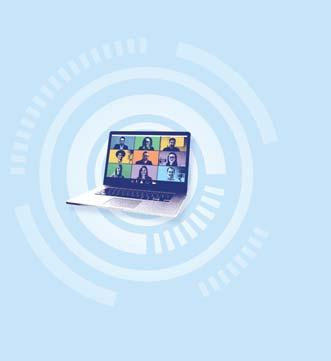

With the process of digitalisation, organisations are evolving and are relying more on digital assistance and skills. These skills refer to skills required to perform basic tasks using hardware, software, and basic online operations. Basic digital skills enable us to access services in a virtual space, engage with others such as government and financial services via online platforms such as social media or mobile applications. Additionally, employees who show eagerness to learn and use these skills can possibly find themselves open to different career pathways they would not have previously considered.

Participation in co-curricular or extra-mural activities, working part-time and/or volunteering provides you with the opportunity to explore and develop these skills. Additional online learning platforms also offer you the means to upskill and have a competitive advantage. For example, short courses can focus on ‘working remotely’ and entails communication skills and emotional intelligence. Within some ‘communication’ courses, you gain insightful tips to use various online tools such as Zoom, Skype, and Microsoft Teams. Also check out courses that build emotional intelligence which include managing stress, thriving at work, building resilience, and developing resourcefulness.
• Defining Critical Thinking. Criticalthinking.org. Retrieved 20 July 2022, from https://www. criticalthinking.org/pages/defining-criticalthinking/766
• Global framework on core skills for life and work in the 21st century. Ilo.org. (2021). Retrieved 20 July 2022, from https://www.ilo.org/skills/pubs/ WCMS_813222/lang--en/index.htm
• Writer, R., & Writer, R. (2020). Creative thinking skills: definition, examples and how to boost. Rock Content. Retrieved 20 July 2022, from https:// rockcontent.com/blog/creative-thinkingskills/#:~:text=do%20not%20spam.-,What%20 is%20creative%20thinking%3F,it%20and%20 develop%20a%20plan
• Welch, W. (2020). Employee Skills for the Post-pandemic Workplace.
The leading global marketplace for teaching and learning, connecting millions of students to the skills they need to succeed.
Partners with the world’s leading universities to select, design and deliver premium online short courses.
A website offering video courses taught by industry experts in software, creative, and business skills.
Provides universal access to the world’s best education, partnering with top universities and organisations to offer courses online.
The trusted platform for education and learning. edX is transforming traditional education, removing the barriers of cost, location and access.
A range of free learning content designed to help you in your business or career with an online digital skills course in everything from marketing to coding and beyond.




 by Simamkele Dyasophi and Mbalenhle Malamlela
by Simamkele Dyasophi and Mbalenhle Malamlela


HYBRID WORK IS HERE! When the COVID-19 infection rates decreased substantially and the vaccine rollout was in progress, we knew that we would be back in the office at some point.
Hybrid-work is a workplace model that involves both remote and in-office work, gradually implemented, depending on departmental and organisational needs. As interns commencing our careers during a pandemic, we share our expectations, experiences, benefits, challenges and tips to manage the transition.
It may not be an easy transition to make, but hybrid work is the future.
Due to the lockdown, Simamkele spent the first nine months of her internship in a virtual setting as she resides outside of Cape Town and was not required to be at the office. Adapting to a hybrid setting meant relocating closer to her place of work, as commuting on a daily basis would have been extremely expensive and time consuming. The adaptation allowed for improved communication during a high pressure period such as the annual Virtual Career Xpo month. Furthermore, it offered much needed exposure to organisational culture and office environment to increase morale.
Mbalenhle anticipated being in office daily however she joined her team after they had seamlessly moved services to a virtual setting, only meeting in person twice a week. This allowed her to continue working from where she felt most productive. Being able to manage her time and being trusted to complete her tasks left her feeling more empowered.
Hybrid work required adjustment, as time and people management are crucial to find an effective balance between virtual and in person engagements. For example, on a day you are required to host an evening webinar you either leave the office early in order to avoid traffic to be online in time for the webinar, or you work from home on that day. Moreover, as we had to remain cautious of COVID-19, workstations needed to be adapted to keep everyone safe.
While engaging with recruiters during the SAGEA Career Fair, Simamkele inquired about hybrid work, these are some of the benefits recruiters noted:
• It allows employees to maintain a good work-life balance;
• It prevents total isolation from co-workers;
• Avoid load shedding – working from the office when load shedding is scheduled in order to avoid losing productivity.
Adapting to a hybrid setting meant relocating closer to work, as commuting on a daily basis would have been expensive and time consuming.
Other benefits of hybrid work include:
• Encouraging your team’s best work. Some employees thrive when they are in the office while others thrive virtually and hybrid allows for both;
• Physical interaction with colleagues is more pleasant and makes it easier to form professional relationships. Unplanned conversations often spark great ideas that could be used to improve the services that are offered by the organisation. This is not to say that ideas like these cannot be sparked in remote work, but they have to be more intentional;
• Minimise costs - hybrid work allows one to reduce travel, meal and fuel costs.
Although this model may work well for some, it does not work for all. The following are a few challenges that hybrid work might present:
• Difficulty in changing routine - once a routine has been created, it might take time to adapt to the new way of working.
• Communication challenges - hybrid meetings can be a bit tricky as those who join virtually may face technical challenges that can hinder engagement and feel excluded from the conversation.
• Redesigning of office space – it can be costly and time consuming to redesign offices to accommodate social distancing.
When transitioning from virtual to hybrid, we see a joining of the two things that we have come to appreciate during the lockdown, which are the opportunities to interact with colleagues face-to-face, and possibly the choice and support of an employer to allow you to work either in-office or work-fromhome. This may not be an easy transition to make, however, hybrid work is the future.
CU
Hybrid work requires adjustment, as time and people management are crucial to find an effective balance between virtual and in-person engagements.
• Gurchiek, J. (2021, January 27). Hybrid Work Model Likely to Be New Norm in 2021. HRM. Retrieved from https://www.shrm.org/hr-today/news/ hr-news/pages/hybrid-work-model-likely-to-benew-norm-in-2021.aspx
• Rockwood, K. (2022, April 09). Make the Hybrid Connection. HRM. Retrieved from https://www. shrm.org/hr-today/news/all-things-work/pages/ collaborating-with-a-hybrid-workforce.aspx
• Ways to thrive in a hybrid work environment. (2022, May 05). Retrieved from https://www.appspace. com/blog/7-ways-to-thrive-in-a-hybrid-workenvironment/
Consider when you are most productive and which tasks you would like to accomplish in the office or at home then establish a rotation schedule with colleagues to ensure adherence to COVID-19 protocols and office resource management.
Don’t be too rigid with your schedule - one of the benefits of hybrid work is the ability to be flexible.
Define your working hourssometimes, flexibility makes it difficult to set boundaries. Be sure to set your own!
Maintaining these boundaries will ensure that you stick to your schedule and prevent burnout.
Communicate frequently with colleagues - since team members work from different locations it does not mean that you should isolate yourself from your colleagues as this will hinder productivity, reduce team morale and limit professional networking.
Make sure to maximise your time in office to utilise office resources and connect with colleagues over coffee.
NOW THAT ALL YOUR PLANNING AND PREPARATION in your job search has paid off, your first day of work might be accompanied by a mixture of nerves and excitement.
The first 100 days in your new job can help you in determining whether you made the right choice, where your areas of immediate growth lie and prove to your new employer that you were the right fit for the position.
Starting a new position is an opportunity for growth and development, however it can present challenges and mistakes are possible. There is not a single person out there who has never made a mistake, you cannot learn and grow by not making mistakes. So, whether this is your first job or not, you will always have to adjust to the new position, culture of the organisation and the people that come with it. Here are a few tips to help you navigate and make the most of the first 100 days in a new position.
It’s normal to be nervous on your first day, but try not to let it get the better of you. They say first impressions always last, so be sure to make a good first impression.
Your appearance also tells something about yourself. By dressing appropriately, you will feel good and exude confidence. In your new environment others will make those first unforgettable impressions based on the ‘cover of your book’. Appearance goes far deeper than your outfit and good body language is important. Smiling when greeting and making an effort to remember names is a good start. As the newly appointed employee, take the time to familiarise yourself with your new working environment. Make sure you listen attentively; take notes that include a floor plan indicating where everyone is seated with their roles.
When building relationships with your new colleagues, ask them about their experiences of their first day at the company and what they think is important to know as a new employee. Familiarise yourself with the policies, procedures and organogram of your department and the wider company. Ensure that you understand your role and responsibilities. Start fostering a relationship with your manager, get clarity regarding your role / responsibilities and expectations. If uncertain about your task or its instructions, ask. Asking is not a sign of weakness rather reliability and maturity.
Get to know the ins and outs of your department. Understand the company’s culture and observe how things are done. Start managing what is expected of you through consistent communication with your manager and host an evening webinar and set out goals you would like to achieve within the first 3 months of your employment.
Start taking responsibility for your own development, identify courses or training offered by the company that are relevant to you. Demonstrate your capabilities and voice your concerns, if you would like to be involved in a specific project - take the initiative to volunteer to be part of the project and bring forth new ideas. Allow yourself to reflect on the past month by evaluating your goals and considering what you can maintain or do differently going forward.
By now, your 1-1 meetings with your manager should include discussions of the goals you have set for yourself and what you have accomplished thus far. Together you should identify areas of development, this means learning to accept constructive criticism and demonstrating a willingness to learn and a maturity to manage your workload.
We hope these tips will assist you in settling into your new role. Remember, all may not apply to you and you should adapt them to your needs. How you use these tips might be influenced by your role and organisation. Although you should focus on learning about the organisation and adjusting to your new role within the first 100 days of working, you should also create a plan for your medium and long term career objectives.
• Dolan, B. (2019). Transition into a new job. Retrieved 13 June, 2022 from Transition into a new job | FEMS Microbiology Letters | Oxford Academic (oup.com)
• Tricker, S. (2020). Navigating modern careers — the first 3 months Retrieved 13 June, 2022, from Navigating modern careers — the first 3 months in a new role | by Shirley Tricker | Medium | Medium
• The Idealist Career Advice Guide to Your First 100 Days at a New Job – Idealist. Retrieved 13 June, 2022, from https://www.idealist.org/en/careers/ first-100-days-new-job
Remember, all these tips may not apply to you and you should adapt them to your needs.

What sets them apart?

CAREER UPDATE shares stories of graduates who have landed their first job. We tracked them to find out what they did during their job search and share the “beyond the box” and remarkable efforts that gave them an edge over their peers.



BA Honours in Biokinetics, 2019 and BA Sport, Recreation and Exercise Science, 2018
Biokineticist, Sport Scientist and Sports Massage Therapist, Biokineticist at The Balance Group, a brand coach for Adidas and a Strength & Conditioning Coach for CR Vasco Da Gama Womens’ team

I began my career path during my second year by volunteering for various sporting events such as the UWC Fast & Flat 10km Run; Varsity Cup Football competitions and the ABSA Cape Epic.
I also invested my time in co-curricular activities such as the Peer Facilitator initiative, Peer Mentoring Programme (PMP) and tutoring.
I applied at institutions for internships and landed the opportunity to work at SportsSkill4LifeSkills (UWC Cricket); Cape Cobras; Ajax Cape Town FC and Cape Town City FC. An “out of the box” way I landed my roles was via the use of social media platforms such as LinkedIn and Instagram where I showcased my experience, abilities and connected with people in my field of work.




 B Com, Information Systems and Management, 2021 Junior Analyst (Technology Assurance Graduate Programme), KPMG
B Com, Information Systems and Management, 2021 Junior Analyst (Technology Assurance Graduate Programme), KPMG
Networking is very important, and there are actually many opportunities to do this than you may think. While job hunting, I attended all the career fairs and prepared questions to ask recruiters (e.g. what skills they sought, what their work culture is like). Afterwards, I would connect with them on LinkedIn and thank them for their advice. I ended up landing my current role after I connected with a recruiter at a UWC Career Fair and she asked me to send my CV to her directly. LinkedIn can be a very powerful tool to connect with people and find new opportunities. Research the companies that you are interested in working at, connect with people and alumni who are in roles that you are interested in. Ask them for advice, most people on LinkedIn are pretty helpful. The advice can give you an edge against other candidates, and it might even lead to them referring you at their company (especially since most companies offer employees an incentive to refer new joiners). Even when you are working in the industry, many of the opportunities you are granted are as a result of your ability to network.
Don’t panic if you don’t have a lot of experience. Build your skills through short courses, seminars, volunteer experience, extra-curricular activities, certifications and projects. In my final year I signed up as a member of multiple societies, a job readiness programme, volunteering and got involved wherever I could. I further developed my skills and industry knowledge in areas such as Agile Scrum Methodology. I learnt programming languages like SQL and PHP. Sites like Google, YouTube (free) and Udemy (R100+) have an abundance of affordable short courses that you can do. A good way to figure out what to learn, is to relook at the people in roles that you are interested in (LinkedIn), see what skills they have, learn some of those skills online and then use these newly developed skills to develop a project that exhibits these new skills.
Projects can fill that gap in your CV if you don’t have formal work experience, so display your compulsory university projects as well. Provide a brief description in your CV about the project, the skills you used, and the outcome. If it’s a coding project, you can use Github to host it and include the link on your CV for recruiters to be able to run your code. Adding projects on your CV can make you stand out against other candidates, it shows that you actually have practical experience and are able to apply your knowledge.



I ensured that my CV was up to date, and had it reviewed by a family member who advised me to customise my CV for each industry. I added detail to each position held so that the reader could see my experience and relevant skills.
I set up my LinkedIn profile, I endeavoured to complete as much as I could for every section, includng a professional picture, a background image (to resonate with my passion for education) and used the ‘Buildyour-resume’ online functionality. I mirrored my CV to my LinkedIn profile for consistency. Once that was complete, I made a list of all the possible careers/positions within higher education (student counselor, career coordinator and even lecturing) that I would like to pursue then commenced my job search. I hoped to assist students meet their career goals, no matter how small my role may be.

I used LinkedIn and other job search platforms and I read up about all the companies I applied to, paid close attention to the progress of my applications, and I ‘followed’ those companies online to see what they posted. I received feedback, some declines, others I went to round 2 but it was not the end for my job search. I applied at 2U for a few positions but this one stood out as it directly impacted the lives of students. I wanted this position, but I knew I needed to be realistic and continue my search.
In October-November, I had 2 interviews for the position at 2U, one with Human Resources and the other with my future line manager. One tip I can give to all students who are in the interview stage is, ‘think before you answer’ – take a moment to listen to the question and then answer with confidence. Some say career and passion do not go together – but for me, my passion drove me into my career and I have never been happier with where I am on my journey.





Many people believe that a degree opens doors to opportunity immediately after completion, I experienced the contrary. I started applying for vacancies early in my Honours year. I used UWC Career Xplora to find IT graduate programmes and other platforms to have a bigger basket of opportunities and applied to vacancies that intrigued me. The job market is extremely competitive, one application does not guarantee success and applied for a variety of roles. Unfortunately, I faced a lot of rejection had to fight the mental battle where I believed I was not good enough.
I realised that the rejection wasn’t necessarily because I was not the best fit for the position, it was just that there were better candidates. These individuals were able to promote themselves and abilities more effectively in their job search documents.
The application process is one of the many hurdles to navigate while seeking employment. The psychometric, skill-based tests, etc. is essential to prepare for. It helps you gain insight into what type of questions you could potentially be asked. This allowed me to deal with my anxiety and I was able to complete the tests with a clear mind. Watching YouTube videos on how to prepare for the tests and taking online exams were definitely my saving grace and extremely advantageous in my job seeking journey. The last hurdle to the finish line was the interview. I would say it is best to ‘be yourself’. In my opinion there is no right way to do an interview. With that being said this does not mean you should not prepare. You have to research the company, what they do and what they stand for. You are not there to market your qualification only but rather a combination of your personality, skills and value add. The interview is the last opportunity for you to convince them why you would be the perfect candidate for the role. At this point the organisation wants to see who you are. They need to see that you align with their values and you are a fit to their culture. Your impression could leave a good mark and open future door.






I researched different type of industries that would be well aligned with my career objectives. Submitting job applications became an everyday ‘job’, as I never skipped a day without applying for a role. Furthermore, my CV was tailored and structured to ensure that it left a good impression with recruiters. Participating in extra-curricular activities while I was a student, was an added advantage as I could elaborate on my experiences in interviews. It allowed me to leverage my knowledge base, keep a positive attitude and not limit myself.


In my final year, I recognised that I had a keen interest in Machine Learning, a new course offered at UWC. It was all novel to me, I wanted to test it to see if it ‘works in the wild’ and entered Data Science Competitions. I specifically targeted Data Science and Machine Learning Engineer positions. These competition experiences were my conversation starters in interviews. Did I win any competitions? Absolutely not. But gained great experience though! Bonus note for all the techies: Use Offerzen.

















 by Ivanka Katts
by Ivanka Katts
WHETHER YOU ARE A FIRST-YEAR STUDENT OR ABOUT TO GRADUATE; there should be no hesitancy to strategise possible career paths and plan your career. A career path represents a strategic sequence of activities that you undertake to achieve your short – long term career goals. The path is not always linear, it may include some trials and errors. You might experience obstacles along the way that will require you to reflect, re-evaluate, perhaps upskill or even change trajectory. Ultimately your experience shapes your career path and allows you to grow personally and professionally.

Many perceive choosing career paths to be that of a complex and overwhelming decision-making process, and they are



correct. Much focus is placed on the end goal rather than the steps that need to be taken which upskills and prepares the individual for the rigours of the world of work. One way you can identify potential career paths is through career and personality tests. These tests allow you to identify your strengths and areas of development.
Determining a career path is stressful and challenging. Setting time aside to strategise while you are a student, can ensure that you are prepared to secure an opportunity at your ideal employer. Take control of your career development for each year. Identify resources that will provide you with the necessary guidance and allow you to explore possible career goals.

A self-evaluation includes making a list of all the skills you have acquired throughout your academic career, part-time experience, interests, hobbies, ideals, and passions.

This can play a critical role in deciding possible career options for you. Consider this, you have been working in retail while pursuing your qualification, possess great attention to detail and leadership skills, and have a passion for fashion or photography
- have you thought about a career in the retail industry? If so, engage with your professional networks. This includes but is not limited to your manager, supervisor or human resources and enquire about possible postgraduate bursaries and graduate opportunities.
Do research about the roles and industries you wish to pursue and focus on the requirements, skills, and responsibilities of that position. In addition, identify organisations whose vision and values align with yours.
Be open minded and engage in different opportunities (especially those that are outside your comfort zone) in order to develop into a sought-after graduate. Create a vision board to map out the steps you need to take.
• Cooks-Campbell, A. 2022. The only guide you’ll ever need for career planning. Betterup.com. https://www.betterup.com/blog/career-planning
• Doyle, A, 2020. What Is a Career Path? The Balance Careers. https://www.thebalancecareers.com/ career-path-definition-with-examples2059765#:~:text=Career%20paths%20typically%20 refer%20to,your%20administrative%20 credentials%20while%20teaching
• Jefferson, C. 2021. Career Path: How to find yours and why it matters. Betterup.com. https://www. betterup.com/blog/career-path
• Lukins, S. (2021). 8 Ways to Boost Your Career Prospects While at University. Top Universities. https://www.topuniversities.com/student-info/ careers-advice/8-ways-boost-your-careerprospects-while-university

Ultimately your experience shapes your career path and allows you to grow personally and professionally.
Attend Student Orientation Week and participate in all the activities within your faculty.
Connect with peers and form a supportive network/learning circle.
Visit your university’s website to learn about your departmental offerings, important staff and lecturers, and career options in your discipline.

Check your faculty handbook to read about module content (what to expect), module combinations and registration requirements. Be strategic in your approach and select modules with your chosen career in mind.
Not sure whether you chose the right degree? Contact your Faculty Advisor and book an e-advising session.
Explore your co-curricular opportunities and identify which activities you wish to participate in each year.
Learn about your campus Careers Service and set up your UWC Career Xplora account to receive notifications on relevant events.
Use the resources available to develop your CV and Letter of Motivation to apply for bursaries, volunteer work/leadership roles and vacation work at the end of your first year.
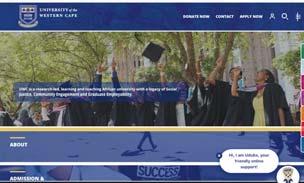
Reflect on the previous year, evaluate your experiences and adjust your goals if necessary.
Participate and attend Careers Service, Entrepreneurship, Leadership and Co-curricular Events.
Engage with lecturers and teaching staff, collaborate and assist on projects, become a tutor, lab assistant, etc.
Participate in the South African Student Survey and the South African Survey of Student Engagement.
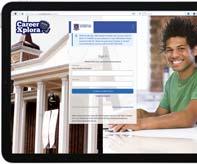
Create a job search strategy and research and identify potential organisations you aspire to work at. Utilise the Employer Directory on Career Xplora and follow company profiles on LinkedIn to remain informed regarding the organisation’s activities.
Recognise your social capital and set up your LinkedIn profile. Attend a LinkedIn webinar to gain tips on how to maximise your profile, connect with alumni, join groups, interact with recruiters and utilise LinkedIn Learning.
Evaluate academic performance, fieldwork experience, co-curricular/ extra-mural involvement, vacation/ casual work and interests and hobbies to assess your value add and professional brand.
Intensify your participation in job search skill seminars and graduate recruitment events and/or student development activities on campus.
Decide on your next step, either pursuing further studies, applying for opportunities, becoming an entrepreneur or travelling. Create a strategy for each possible career goal.
Apply for your UWC Co-Curricular Record and identify potential referees who are credible and willing to testify to your academic potential, work related experience and/or character.
FINAL YEAR CONTINUED
Update and finalise your CV and Letter of Motivation (submit to Careers Service for a review).
Create job alerts on UWC Career Xplora and other job search platforms such as LinkedIn.
Apply for internships and graduate trainee programmes and create an application tracker to track application deadlines and all your applications.

Prepare and practise for your interview by attending the Interview Preparation webinar and utilise the Mock Interview tool on Career Xplora.
Complete your graduate exit survey.
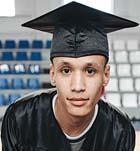
Attend Alumni networking events
Register for membership to the UWC Online Alumni Portal. Sign up for training at the Centre for Entrepreneurship and Innovation
The process might seem challenging to begin with, but will be rewarding in the end
There are countless resources and opportunities available at your fingertips.
Do not wait until your final year to get started or opportunities to come to you.
Take charge of your journey and avoid saying “if I had known...”
CAREER PLANNING 38 | UWC CAREER UPDATE 2022 If you need more assistance in planning for life after graduation contact your Careers Service office for guidance.
You have access to the UWC Career Xplora portal for three years after graduation.There’s more to your student experience than just a good academic record - it helps to graduate with some formal recognition of your prior work experience, leadership roles and taking part in many projects and tasks while studying.
The Co-Curricular Record (CCR) at UWC can help you stand out in the crowd. This is why the Division for Student Development and Support encourages all UWC students to apply for the recognition of their Co-Curricular portfolio.
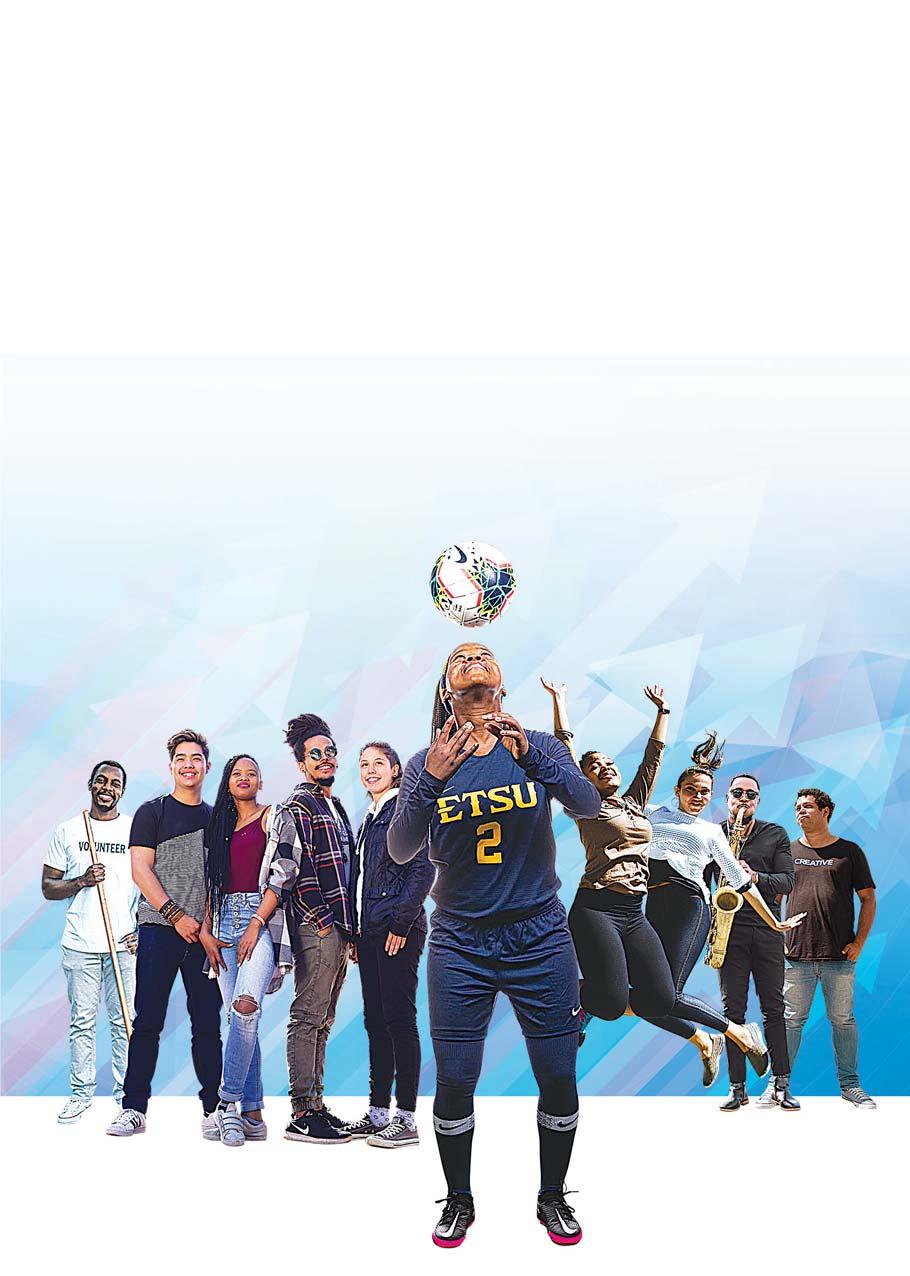








 by Mbalenhle Malamlela, Bridgetti Mashabane and Rone Gerber
by Mbalenhle Malamlela, Bridgetti Mashabane and Rone Gerber
EVEN THE MOST SELF-ASSURED INDIVIDUAL might find the job search difficult. Job search is a stressful process for any graduate, as much as it is an exciting new chapter, the realities of securing employment or starting your own business can be overwhelming. When you’re concerned and apprehensive about the hiring process and if you will finally get
that offer, this can be seen as “healthy stress” that serves to motivate you. With South Africa’s high unemployment rate, stress may be exacerbated by concerns about how long it will take you to find employment after completing your studies. There is much uncertainty that comes with transitioning from university into the world of work, as

you are not sure what to expect and how to navigate this process. There are many reasons why students may find the job search process stressful and daunting. Below are a few examples.
Concentrating on your perceived limitations. These feelings of inadequacy can prevent you from putting your best foot forward and landing that job. Being overly hard on yourself can sabotage your job search and make it stressful. Others may also be unable to see your great qualities because you lack self-compassion and are critical of your flaws.
When it comes to job search, the fear of rejection can have far-reaching implications. The cold reality of job searching is that it will include the word “unsuccessful”, learn to not take it personally. Ensure that rejection does not overwhelm you and result in you missing out on advice for adjusting your job search strategy and future opportunities. The fear of rejection can strike hard and fast during the job search resulting in heightened stress.
Being unable to financially support or provide for your family soon after graduation, has proven to be one of the most stressful aspects of the job search process for graduates. As a first-generation graduate, you may face additional pressure from family, which is amplified by the expectations of “black tax”. Comparing yourself to peers on how far they have come can harbour more stress. These expectations may result in a mental breakdown and self-harm.
Your degree will not guarantee you your dream job immediately after graduation. Setting unreasonably high and unrealistic expectations, after graduation, can add to your stress if you don’t secure the job you ideally want. The lack of understanding your capabilities can hamper your chances of marketing yourself effectively for a role that is ideal for your career growth.
Applying for jobs that aren’t a good fit for you or where you do not meet the criteria can demotivate your job search. Using the ‘SPRAY AND PRAY’ method will also increase frustrations. Here are a few tips to manage the stress and anxiety that comes with your job search.
Setting unreasonably high and unrealistic expectations, after graduation, can add to your stress if you don’t secure the job you ideally want.
Job search is not a once-off task, it is time consuming and will feel like a full-time job / entire course in itself. Therefore, you need to strategise and plan your job search.
• Get organised as a potential job seeker in your second year. This will entail creating the following:
- a folder of all potential companies and opportunities you are interested in.
- a timeline highlighting when you will
finalise your job search documents, attend recruitment events and commence actual applications.
- an application tracker which includes the platforms you’ll use to look for entry level jobs and track your applications and opportunity deadlines.
• Set time aside each week/month for your job search. This could mean conducting company research and attending recruitment events to network; job-shadowing/virtual vacation work and setting mini-targets of industries or roles you wish to apply for. This will allow you to minimise the pressure of applying for jobs in your final term and after exams.
Lack of self-awareness makes job search tedious. Reflect on your qualification, skills and capabilities and what value add you bring to a team/organisation. Being consciously aware of who you are and what you are capable of will encourage you to identify a variety of career paths you could embark on. Self-reflection and awareness can help you with your personal branding and provide an advantage when you present yourself to your prospective employers in a confident manner.
Being rejected is often the time when you can fall into the trap of negative self-talk and lose confidence. This can increase the possibility of becoming very anxious and even depressed. Learn to talk yourself into a positive job searching state of mind. Regardless of the outcome, being shortlisted and interviewed is an achievement. Use the experience to improve on your preparation, ask the recruiter for feedback and what you could have done differently.
It is important to celebrate the small wins to boost your confidence and help you get through the rest of your job search.
It is important to celebrate the small wins to boost your confidence and help you get through the rest of your job search. Positive self-talk is key as it leads to positive actions. Make use of phrases like, “I am good enough”, “I answered that question well”, and “I can do it”. Talks that you have with yourself can turn into self-gratification prophecies.
Lack of self-awareness makes job search tedious. Reflect on your qualification, skills and capabilities and what value add you bring to a team/ organisation.
Reassessing your career goals can assist you to reflect and adjust your next steps. It can aid you to become ‘unstuck’ and back on course, possibly leading to a better professional path than the one you initially envisioned. For example, have you considered a side hustle? Consider other industries that could use your knowledge and skills, for example, accounting or law
graduates should not limit their job search to ‘articles’ only. Perhaps you can use your undergrad qualification as a stepping stone into teaching and follow it up with a Postgraduate Certificate in Education. Volunteer at a startup or NGO. The options are endless.
Be open to having a ‘side hustle’, it could ease some financial burden and help you generate an income while you are job searching. You never know if this initiative can grow into a fully-fledged business wherein YOU employ others.
Do not isolate yourself during this process, no man is an island. Reach out to family/ friends and/or your lecturers for emotional support; guidance for your job search; to find out about job opportunities and make connections with potential employers. In
addition, make use of the free services available on your campus. The Careers Service at your institution has all the information you need to learn about creating a job search strategy, do your research, speak to your Career Advisor about your intentions, and use all the job search tools available to you. Visit the UWC Career Xplora portal for more information.
One of the most effective antidotes to this type of stress and anxiety is to be organised and adequately prepared. Stress is not always a bad thing, as it can lead to an important learning curve. However, when stress starts becoming overwhelming and causes anxiety, that is a sign that you should look at how to manage it.
Maintaining a positive and calm attitude during your job search gives you an opportunity to take steps towards the right direction, which will help you stand out to recruiters and can ultimately lead to you landing your ideal job. Look at this new phase of your life as a challenge that you are prepared for and ready to take on. Start early to learn the skills needed to search for a job, prepare the documentation, conduct the interview and succeed in your goals.
If you are experiencing feelings of anxiety and depression relating to your job search, consider speaking to a professional mental health practitioner to assist you in this process. At UWC, you can reach out to the Student Mental Health Helpline available 24/7 on 0800 222 333. It is a free call from any device and a professional mental health practitioner will answer your call and offer the counseling requested. The alternative is to send an email request for counseling to csss@uwc.ac.za


Our unique annual rotation structure is a central part of our engagement with CAs and is key to developing them into the firm’s future specialists and leaders. If this appeals to you, apply now.




 by Bridgetti Mashabane
by Bridgetti Mashabane
YOU ARE ABOUT TO RECEIVE YOUR FIRST PAYCHECK, and you’re overjoyed at the prospect of having your (own) money, but with it comes responsibilities and expectations of supporting your family. For some, having to support your loved ones financially can be a blessing while for others it can be daunting. No one wants to feel animosity towards their family as a result of Black Tax.
Carpenter & Phaswana (2021) defines ‘black tax’ as the financial burden borne by black South Africans, who have to pay or transfer money and other goods to support their direct and indirect families. Most South African families do not have generational wealth. The first ones to graduate are usually responsible for financially supporting their family, particularly if parent/s are unemployed or earn less than the minimum wage. Statistics show that as many as 28% of South Africans who live and work in metros support their immediate families as well as other dependents, with this statistic growing by 2% annually.
It’s natural to want to “splash” your first paycheck and enjoy your hard-earned cash by pampering yourself and others without feeling guilty. While there’s nothing wrong with spoiling yourself and loved ones with your first paycheck, be mindful of creating expectations that could lead to problems at a later date.
Here are a few tips to manage your Black Tax responsibilities!



As a first-time employee, you are likely to focus on the amount being offered. Make sure you understand the total cost to the company and all the relevant deductions.




This will allow you to make sound financial decisions. It is a great idea for you to request a draft pay slip for you to understand the deductions (PAYE, Medical Aid & Pension Fund) and determine your nett pay (total earnings after deductions).

Employee code: Employees are assigned a staff number (as students are assigned a student number).
Employee: Mashabane, B (ID: 1231231231231)
Employee Code: 123123
Employee Address: 12 Queen Road, Bellville, 7535
Employer: Smith Accountants Department: Support
PAYE Number: 1234512345
Medical Details: Med Fund Dependants: None Start Date: 2018-01-01
Deductions: Money deducted from an employee's earnings for identified items.
Basic Cash Housing Allowance Overtime
Gross Income/Total Earnings: All cash, overtime and majority of benefits such as medical aid, group schemes and housing allowance. This is the amount you receive prior to deductions.
Description Taxable Amount
Basic Cash Housing Allowance
Medical Aid ER Retirement ER
Taxable Amount: The portion of your income and benefits that are subject to tax.
Group Life ER
Total
Account Details
Name of bank (xxxxxxxxx)
Company Contributions: An employer’s contribution to employee benefit schemes.
Total
Position: 1234512345
Pay Date: Med Fund
Annual Leave Balance: None Accumulative Leave: 2022-01-01
Medical Aid Tax Credit PAYE
UIF EE
Funeral Scheme Medical Aid EE
Provident Fund EE
Bonus Tax Provision Group Life EE Loan/Garnishee order
Trade Union
Total Deductions Nett Pay
Monthly Bonus Provision SDL Levy Med Fund
Provident Fund
UIF Employer Contribution
Group Life ER
Total
Now that you know how much you will be earning each month, take time to create a budget. Make a list of all your personal expenses: rent and utilities, transportation, groceries and toiletries. This will give you an idea of how much you have left for additional expenses such as family responsibilities, savings and investments, and recreation.
Being disciplined is essential when it comes to budgeting. Sticking to your budget will also help you say “no” to impulsive purchases or random cash requests from others. There are mobile apps and websites available that can help you manage your finances.
Old Mutual lists the following apps as the top financial and budgeting apps to use today:
Payslip example and what you need to take note of:
Mint gathers information from your various accounts, keeps tabs on your spending, and helps you create a budget based on actual expenditure. It also serves as a credit tool by pulling your credit report and advise on how to improve your credit score for future loans.
able to assist as you have your own financial needs and goals to plan for. As much as this might be a difficult conversation to have especially with your parents and/or grandparent/sibling, it’s important to do so in order to help everyone adjust and live within their means and manage the cycle of dependency. Help them do a needs analysis by identifying needs versus wants.
This app allows you to keep track of your expenditure in reference to your budgeting plan. This tool has the ability to be configured to stop you from overspending if you have a tendency to do so. Additionally, it includes a built-in feature that enables you to sync your budget across all of your devices so that you can effectively manage your money. It also aids in keeping you accountable and on track with your financial goals.
You can do this by using the 50 30 20 budget rule. Income received divided by 50% spent on needs, 30% on wants and 20% on savings. In most cases needs will take up 80-90% of the income if not all.
However, it is about encouraging especially your younger siblings and shifting their mindset to make the effort to plan for the unexpected and learn to save each month. Saving is a long-term commitment, you can start with any amount, no matter how small, but it is about consistency and investing in your future.
Similar to Mint, this app gathers information from all of your accounts into one location. It has the capacity to track what you have, what you owe, and what you can borrow, including bank accounts, credit cards, store accounts, loans, and even rewards. The app also allows you to set and monitor a budget. If you don’t like using apps, an easy, safe, and cost-free budgeting tool is a simple MS Excel spreadsheet.
It is important to have an open conversation with your family regarding what you can and cannot assist with based on your budget. Set boundaries by making them understand that you might not always be
Speak about your family income and expenses. Perhaps commit to certain monthly family expenses. This shows that you understand your financial responsibilities and that you are ‘adulting’. Set saving plans for certain requirements together.
Don’t wait for payday to contemplate the above. Reach out to others for tips on how they have managed Black Tax expectations.
Check out Law student at UWC/Student Investor/Financial Ed content creator/ Youtuber @IvynSambo on Twitter, TikTok and Youtube to join the conversation to managing your money and Black Tax.


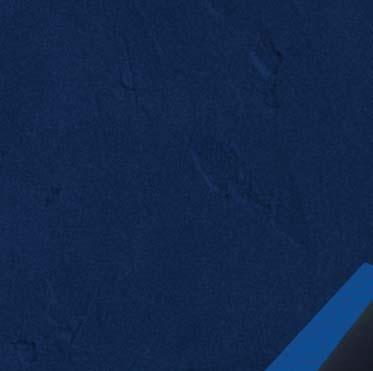
Every year, the South Africa Institute of Chartered Accountants’ (SAICA’s) Thuthuka Bursary places fully bursared African and Coloured students at selected SAICA-accredited universities in fully funded and supported undergraduate BCom Accounting education programmes to help them reach their dream of becoming a chartered accountant [CA(SA)].






Thuthuka is a bursary like no other. Covering more than just your tuition, books, meals and accommodation, Thuthuka also gives you an allowance, mentorship, additional lectures and soft skills training in order to help you bridge the gap between high school, university and the world of work. In fact, whatever you need to succeed and achieve your CA(SA) dream, Thuthuka will make it happen!
So if you’re an African or Coloured Grade 12 learner who is achieving level 5 pass in Maths (not Maths Literacy) or a university student
how to apply at www.thuthukabursaryfund.co.za202 close at the end of Let Thuthuka help you make your bright future happen!
Applications for 202 close at the end of today - visit www.thuthukabursaryfund.co.za.
There is much talk about the increasing number of law students graduating annually from universities across the country, and whether the legal profession can absorb that many new lawyers year on year. Given the time and financial commitment students make to obtain their law degree, this is certainly a relevant question. It’s important, therefore, that students considering law, or already in the course of their studies, understand the career options within the legal field. This article looks at the changing face of legal services, the different kinds of organisations and institutions one can serve articles with, and the different ways one can use a law degree to access opportunities within the private and public sectors.
For those who enjoy the application and practice of law but are looking at careers other than practising attorneys the following are some options to consider:
• Mediation or Arbitration: Alternate dispute resolution (ADR) is a fast-growing sector with the legal industry, offering options that are quicker and more cost effective. For this reason, we are also seeing instances in which ADR is even mandated by courts. A career as a mediator or, in the longer-term, an arbitrator is worth bearing in mind if your interest lies in dispute resolution. There are a host or institutions that offer arbitration and mediation training and accreditation.
It’s important to bear in mind that practice is not everyone’s cup of tea. One can have a successful and stimulating career in the legal sector without having completed articles, and without being admitted as an attorney. Examples include:
• a career in academia as a lecturer, which then places more value on post-graduate legal qualifications such as an LLM, LLD, publication of legal articles in journals, speaking at conferences and so on;
• a career as a legal researcher or legal author with companies such as Lexis Nexis or others that produce legal publications.
For law students who find the study of law more appealing than the practice of it, then the options above are career paths worth exploring.
• Ombuds offices: Innovative developments within our legal sector mean that working in private practice or the public sector are no longer the only avenues one can pursue as a legal career. Options within regulatory bodies such as an Ombud’s office have expanded significantly in the last few years with the growth of institutions such the Pension Funds Adjudicator, the Long-term Insurance Ombud, the Short-term Insurance Ombud, Office of the Health Ombud etc. If your interest lies in dispute resolution and also academia then the work in these institutions may well appeal to you as the role involves considering, investigating, researching and drafting determinations in the disputes referred to these offices.
• Tax consultant, insurance assessors: Tax consultants create tax strategies for their clients and plan their financial futures. An assessor will focus on the claim situation (what happened, where, when, how) and will determine whether it fits within the scope of cover and what the repair or replacement cost is. These are options worth exploring for those who enjoy tax law or insurance law as a subject but don’t wish to practice in those areas as an attorney.
What can I do with a law degree outside of practice?


To become an advocate, law graduates must complete one year of pupillage with a practising advocate. Graduates must apply to the relevant High Court to be admitted as an advocate and included on the “roll of advocates”. During your pupillage you will be required to write and pass the National Bar Examination of the General Council of the Bar. Once completing pupillage and becoming a member of the Bar you will need to join a group of advocates. For further information on how one can be admitted as an advocate, please see the relevant Bar society located in your province.
Admission as an attorney or advocate is not a requirement to many job opportunities. Law graduates can work as in-house legal counsel, serve as legal advisors or compliance officers to companies, whereby graduates advise companies on various areas of their business. A compliance officer is an individual who ensures that a company complies with its external regulatory, legal requirements, including internal policies and bylaws.
To become an attorney, law graduates may either complete their Practical Vocational Training (PVT) over two years at a law firm or attend a Professional Legal Training Course of their choice and serve one year of articles thereafter. Practical Legal Training (PLT) is a compulsory course during PVT that teaches graduates specific skills and prepares a graduate for their board exams. Graduates must complete PLT and write and pass the Attorney’s Admission Examinations before they can be admitted as attorneys. In total, there are four examinations namely Estates, Bookkeeping, Ethics and Court Procedures. Once completed and passed, one must apply to court to be admitted as an attorney. Once admitted as an attorney there are many different types of specialist lawyers that one can become, including Criminal, Conveyancing, Commercial Immigration, Family, and Tax lawyer.
For further information on how one can be admitted as an attorney, please visit: https://lpc.org.za/ https://www.lssalead.org.za/
The public sector encompasses all those institutions connected to the State. However, law students often don’t investigate these options sufficiently when considering their career paths after graduation, which is a pity as the public sphere does in fact offer a diverse and wide range of opportunities for law graduates. These include working within the judiciary (i.e., the courts), State and Government institutions, and in the criminal justice system, to mention a few.
A sought-after opportunity for law graduates is a position at the Constitutional Court or Supreme Court of Appeal as a law clerk. One’s responsibility in that role is to provide necessary assistance and support the judge needs to fulfil his or her judicial duties. The law clerk’s primary responsibility is to assist the judges prepare for the court hearings, and to assist with preparing judgements for publication once the judges have drafted them. This may include, to mention but a few, detailed research on particular topics; preparing analytical summaries of counsel’s written argument or evidence and assessing arguments in the light of comparative case law and legal literature. There are also opportunities in our courts to work as a judge or magistrate, judges’ secretary, court registrar or clerk, or estate controller – Master of the High Court. So, if a career in the judicial sector is ultimately what interests you there are various avenues to explore that further. who ensures that a company complies with its external regulatory, legal requirements, including internal policies and bylaws.

There are various State departments that offer positions for law graduates. Within the State, one can be employed as a State legal adviser, for either of the chapter 9 institutions (e.g., the Public Protector), in Parliament (e.g., policy research and drafting of legislation), or for the South African Reserve Bank. Opportunities in Government would include positions at national level (i.e., Office of the Presidency) and internships, Inservice training, work integrated learning and work experience positions in various fields at provincial and municipal level. One can also work at the various state-owned enterprises (for e.g., Transnet, SASSA, and Telkom etc.) through their respective graduate programmes and internships.
Opportunities within the criminal justice system include investigative and prosecutorial roles such as Public Prosecutor in Magistrates Courts and State Advocate in High Courts, working for the Special Investigating Unit (SIU), or the Independent Police Investigative Directorate (IPID). If you are passionate about criminal law the National Prosecuting Authority (NPA) offers an annual Aspirant Prosecutors training programme which seeks to train and equip candidates with the necessary prosecutorial skills to eventually become prosecutors at various magisterial districts and regions. There are also opportunities to work in the various business units within the NPA such as the Specialised Commercial Crime Unit, Asset Forfeiture Unit, and the Priority Crimes Litigation Unit, to mention a few.
You may be wondering how to take your legal career beyond the borders of South Africa. If you have graduated with a LLB degree from a South African university, you can still utilise your degree abroad. For example, in order to be able to work in the UK you can sit the Qualified Lawyers Transfer Scheme exam and thereafter will go through the same processes as someone with an English LLB in order to qualify as a barrister or solicitor.
There are a host of alternative career paths. For example, opportunities exist for legal careers within tribunal bodies or commissions such as the Competition Commission or the Companies and Intellectual Property Commission. For those interested in technology, there are also opportunities to combine one’s interest in law and technology in the growing field of legal tech development.
This article provides a brief insight into the range of legal career options available to LLB graduates. Don’t be afraid of trying new career options and forging your own pathway in your legal career.

Lighthouse Law is an innovative legal services provider. We help clients manage their commercial contracting and get the right deal outcomes, providing advice grounded in commercial realities. We build our service around understanding our clients’ objectives, providing expert legal guidance with price certainty.
For more information about Lighthouse Law and the Lighthouse Academy: website: https://lighthouse.law/ email: jobs@lighthouse.law
The Lighthouse Academy is our training and skills development programme for law graduates in South Africa. The Lighthouse Academy is a 12-month paid internship for law graduates who satisfy BBBEE criteria. The purpose of the Academy is to use our sphere of influence as commercial lawyers to contribute meaningfully toward transformation in our society.
We do this by providing a program that combines sound training and experience in commercial law to make law graduates more marketable and better able to enter this area of the legal industry. We’re proud of how committed our lawyers are to this program, participating actively and enthusiastically in the training and ongoing mentoring of our students.





therefore, provides I/OP students with a few additional careers to consider.
As Industrial/Organisational Psychology (I/OP) graduates we only focused on Human Resource related roles during our job search. We realised quite late that our discipline offers numerous career opportunities. In our roles as interns at the Office for Student Development, we noticed that this also applied to our I/OP peers. This article
Industrial/Organisational Psychology is a branch of Psychology that studies human behavior in the workplace to improve work behaviour, the work environment, and psychological conditions in the workplace (Riggio, 2013). If you are interested in solving work and employer/employee related problems, this is the field for you.
HAVING AN UNDERSTANDING OF THE VARIOUS CAREER PROSPECTS within a discipline allows you to make informed decisions on areas of specialisation and plan a strategic job search.
The following are some of the opportunities you could pursue with an I/OP qualification:
• Career Advisor
• Psychometrist
• Consultant
• Human Resource Manager
• Training and Development Practitioner

• Labour Relations Practitioner
Career advisors assist individuals in making the correct choices regarding their education, training, work and career paths, by providing expert advice, information and guidance.
According to the Health Professions Council of South Africa (HPCSA) a psychometrist is a psychological practitioner that administers, scores, interprets, writes reports, and provides feedback based on psychometric assessments.
A consultant provides professional advice in their expert field to either an organisation or individual. Consultants often work on client-facing and/or research based projects.

Human resource managers oversee the recruitment and selection of new staff, consult with top executives on strategic plans, and function as the link between management and their employees.
A training and development practitioner assesses company-wide developmental needs to drive training initiatives, and identifies and arranges suitable training solutions for employees.
Labour relations practitioners guide employers in complying with labour laws, helping to ensure that labour contracts correspond with the organisation’s fundamental responsibilities and business practices.
Career Update (CU) caught up with UWC Alumni and I/OP professionals, Jacques Van Zyl and Anwar Van Der Schyff to learn a bit more about the field and their experiences.
If you are interested in solving work and employer/employee related problems, this is the field for you.
Jacques Van Zyl (JVZ) is an Organisational Development Practitioner and Industrial Psychology intern at the Western Cape Government. He is a member of and serves on the UWC Golden Key International Honour Society Executive Chapter; and was a volunteer and teaching assistant at the UWC Industrial Psychology Department. There, he developed an electronic tool to assist students in the data collection process during their psychometrics course. Jacques is currently a Masters candidate in Industrial Psychology.
Anwar van der Schyff (AVS) supports organisations with organisational effectiveness, change management, developing resilience capability, leadership development, coaching and mentoring and strategy development. He also lectures at postgraduate level at the UWC EMS Faculty, and is the Head Tutor for Organisational Resilience at the Oxford Business School. Anwar holds qualifications in Industrial Psychology, Advanced Business Management and Leadership Management. These courses are benchmarked against the content as deployed for the GIBS MBA programme, advanced strategic management and he is an accredited Executive Coach.

JVZ: I was always interested in problem solving. At first, I studied Information Technology encouraged by a career guidance counsellor and in my second year realised I was not enjoying it. I discovered Industrial Psychology (I/OP) while researching how to become a Career Counsellor. I started working in sales while studying IPS and then an administrative role in Government. Eventually, I looked for I/OP related roles in the public sector, where I became involved in Job Analysis, then People Analysis where I moved into my current Organisational Development role.
AVS: I’ve always had a passion for working with people. Inspired by my mother, an English teacher, I too became a teacher. I started working in HR at UWC and later worked in Training and Development and Employee Assistance. After working at UWC for about 10 years, British American Tobacco (BAT) approached me where I worked for 14 years in 42 different countries. I left BAT to start my own consulting business.
What skills were important to rely on for your career growth?

JVZ: I relied on time management (as I have always studied while working), computer literacy, interpersonal and communication skills.
AVS: Appreciation, strength, resilience, optimism, authenticity, high standards and good quality work.
What advice would you give students planning to pursue a career in I/OP?
JVZ: Always plan your next career move - know what the next step is, how to get there and develop the needed skills. Constantly improve your CV to ensure it matches the job application requirements with relevant and reliable referees.
AVS: Take ownership and responsibility of your career. Be a lifelong learner - be hungry to learn. Don’t follow blindly, instead ask questions and find teachable moments. Appreciate where you are in the moment, don’t be influenced by negative people and thoughts.
What skills gap have you identified in I/ OP professionals ?
JVZ: There is a lack of computer literacy and research competence and these aspects should be incorporated into the Industrial Psychology curriculum. I think that business intelligence skills should also be emphasised for future I/ OP practitioners.
AVS: Focusing too much on Human Resource functions. There is not enough flexibility and agility to address the needs of the South African context. We need to build more resilience, embrace change and challenges and have more coaches and mentors in our field. Skills that will be important in the future: discovering, knowing and owning your own brand, self-awareness, authenticity, self-care and working on your emotional intelligence (EQ).
If you were entering this field today, how would you change your preparation to adapt to the new world of work?
JVZ: I would focus more on how technology features in I/OP and use online learning resources like Udemy, Allison, Coursera, etc. I would also use LinkedIn to network with and learn from I/OP professionals.
AVS: The profession is very different from when I started. Now there are more opportunities. If I were entering the world of work today, I’d try to understand it better by doing effective industry research, and grab the opportunities that are available to me as a student.
So there you have it, some words of wisdom from Jacques and Anwar. There are many successful UWC I/OP graduates who have carved a niche for themselves. In addition to Jacques and Anwar, do check out Mawande Moloi and Dean Mazhawidza profiles’ on LinkedIn to network using your UWC social capital.
• Professional Boards - HPCSA. Hpcsa.co.za. (2022). Retrieved 4 July 2022, from https://www.hpcsa.co. za/?contentId=0&menuSubId=52&actionName=Pr ofessional%20Boards
• Riggio, R.E. (2013). Introduction to Industrial/ Organisational Psychology. United States of America: Pearson Education Inc. (6th ed)
• Skills and qualities needed to be a Career Advisor | ULaw. Law.ac.uk. (2021). Retrieved 4 July 2022, from https://www.law.ac.uk/employability/ career-finder/career-advisor/
• What is a consultant? Consultancy.uk. Retrieved 4 July 2022, from https://www.consultancy.uk/ career/what-is-a-consultant
• What is a Human Resource Manager? (2022). Retrieved 09 June 2022, from https://www.tuw.edu/program-resources/ what-is-a-human-resource-manager
• What is a Labour Relations specialist? (2022). Retrieved 09 June 2022, from https://online. maryville.edu/online-bachelors-degrees/ human-resource-management/careers/ what-is-a-labor-relations-specialist/
• Training and Development Manager. (2022). Retrieved 09 June 2022, from https://www.shrm. org/resourcesandtools/tools-and-samples/ job-descriptions/pages/training-anddevelopment-manager.aspx
At Webber Wentzel, Our stated purpose is ….
“to have a transformative and sustainable impact through our work and actions”.
Visit our early careers page at grads.webberwentzel.com to apply for 2024 and 2025 articles.

THE WORLD IS SWIFTLY MOVING into the Fourth Industrial Revolution and Web 3.0 – the new era of intelligent technologies and the internet.
There has been constant encouragement and promotion for technological skills development and the need for those with science and mathematics-related degrees, however, many companies have noted the importance of the humanistic approach to the creation of these new technologies. In 2020, the World Economic Forum listed the Top 10 Job Skills of Tomorrow, which
included skills such as critical thinking and analysis; creativity, originality, and initiative; leadership and social influence; reasoning and problem-solving. These skills are often found in Arts and Humanities graduates.
At UWC, the Faculty of Arts and Humanities offers high quality education at undergraduate and postgraduate levels in a variety of fields where graduates are equipped with the skills of critical thinking, effective communication, and the ability to interact well in contexts of social diversity.
Career Update (CU) caught up with a few UWC Bachelor of Arts alumni to find out how their degree shaped their thinking and provided the platform to develop as professionals in their specific and varied fields.

Brandon Jenniker (BJ) works as a Junior Research Analyst. He is a Bachelor of Arts (Honours) –Political Studies graduate. Brandon is currently completing his Master of Arts degree in International Relations.

Mauricia Abdol Tshilunda (MAT) is a Global Youth Advisor, the CEO of Data Works Co., a member of the UN Youth Coalition on Internet Governance committee as well as a member of the Internet Society Youth Standing Group Committee, the Founder of ElevateHER Africa Network and a Researcher. She is a BA (Honours) – Psychology graduate.



Thaakierah Jefferies (TJ) is an unconventional author (self-published through Tshienda Publications) and copywriter. She is a Bachelor of Arts - Linguistics and English graduate. You can find her first book ‘2020: Need I say more?’ on Amazon: https://amzn.to/3If1D7D
BJ: Lateral thinking, because most modules in Arts and Humanities degrees interlink, you are forced to think laterally. Conflict management, as you are faced with different opinions, some that you may not agree with, but it builds you as a person. I also learned how to make a good argument due to the fact that most of our assignments were essays where we had to fact check (another skill) and argue our reasoning, and develop our debating skills. The most important skill you will learn in a BA/Humanities degree is the Big Question - ‘Why?’.




With our local insights and global reach, our graduates build a fulfilling career working with world-class experts in our Audit, Tax and Advisory teams. It’s time you joined a firm that helps you reimagine your future.
• External Audit (Including the Chartered Accountant Advisory Programme)






• Tech Assurance
• Deal Advisory
• Digital Consulting


• Internal Audit Risk & Compliance




• Financial Risk Management
• Tax
© 2022 KPMG Services Proprietary Limited, registration number 1999/012876/07, a South African company and a member firm of the KPMG global organisation of independent member firms affiliated with KPMG International Limited, a private English company limited by guarantee. All rights reserved. MC17890


The KPMG name and logo are registered trademarks or trademarks of KPMG International Cooperative, a Swiss Cooperative.

TJ: Phonetics, translation, transcription, analysing, different types of communication (which helps especially in my current job), and writing. At UWC we are able to dip our toes into modules in other faculties through the Arts and Humanities programme, I learned not to limit myself in terms of what I wanted to learn.
MAT: Communication skills, strategic thinking, writing, management, psychometry, research, facilitation and interpersonal skills.
In 2020, the World Economic Forum listed the Top10JobSkillsofTomorrow, which included skills such as critical thinking and analysis; creativity, originality, and initiative; leadership and social influence; reasoning and problem-solving.
BJ: I’m still in the very early stages of my career, trying to get my foot in the door, but I do have a career plan. I was insecure when I started working, but through hard work and effort I overcame my insecurity and realised that no one becomes good at their job or successful overnight.
TJ: I started my career as an author in 2020, as I was trying to figure out what I could do after studying. Writing came naturally to me and was something I enjoyed. I made use of a vision board to map out my writing and career. The process of becoming a self-published author was a challenge. I began working as a copywriter in 2021 when I was still developing my professional identity. There was a backlog of work when I first started, which made it challenging to balance my studies and work.
MAT: As an Arts and Humanities graduate I was not aware of the career paths available to me, with the added pressure of negative ‘unemployed BA graduate’ comments, it led me to procrastinate. Entry-level roles were not easy to identify, I took the initiative to explore the opportunities that were right in front of me, i.e., research assistant roles, tutoring, student assistant roles, etc. My best advice to students would be finding an opportunity that makes you excited to get up each morning.
Why do you think it’s important to study Arts and Humanities degrees?
BJ: Through Arts and Humanities degrees you learn to ask why and what makes people tick, you learn to understand people and how various things affect people’s livelihoods which then informs every other aspect of life.
TJ: Arts and Humanities degrees draw focus to skills such as human interaction, observation and communication – skills that are relevant to many careers.
How have you crafted your career, and what were some of the challenges you had to overcome?
MAT: The most important aspect that Arts and Humanities degrees offer is the humanistic approach that all careers; ideas and inventions need.
There you have it, your Arts and Humanities qualification offers a myriad of opportunities where you can identify the links between your knowledge and how it contributes to solution making processes. This means that you can become the social innovator and/or artist that transforms society through redefining the narrative, changing stereotypes, giving a voice to the voiceless and building a more inclusive world.
I used Career Xplora after I graduated and I still use it today. It is an important resource students should utilise as often as possible. LinkedIn is another important platform that students should use. I used it to find and apply for my current position.
A significant contribution to my job search came from the Office for Student Development (OSD). I used OSD’s CV review services and attended the Career Xpo events. Later in my career, I became an entrepreneur.
I found my current job through word of mouth, and I use LinkedIn frequently.
Analytical thinking and Innovation
Active Learning and learning strategies
Complex problem-solving
Critical thinking and analysis
Creativity, originality and initiative
Leadership and social influence
Technology use, monitoring and control
Type of skill
Problem-solving
Self-management
Working with people Technology use and development
Technology design and programming
Resilience, stress tolerance and flexibility
Reasoning, problem-solving and ideation
of all employees will need reskilling by 2025.
• World Economic Forum. 2019. These are the top 10 job skills of tomorrow – and how long it takes to learn them. [online] Available at: https://www. weforum.org/agenda/2020/10/top-10-work-skillsof-tomorrow-how-long-it-takes-to-learn-them/ [Accessed 14 June 2022].
• World Economic Forum. 2021. Why the arts and humanities are key to the future of tech. [online] Available at: https://www.weforum.org/ agenda/2021/11/arts-and-humanities-criticalfuture-of-tech/ [Accessed 14 June 2022].
• XR Today. 2021. What is Web3? What it Isn’t, and When Can You Start Using it? - XR Today. [online] Available at: https://www.xrtoday.com/mixedreality/what-is-web3/ [Accessed 14 June 2022].























